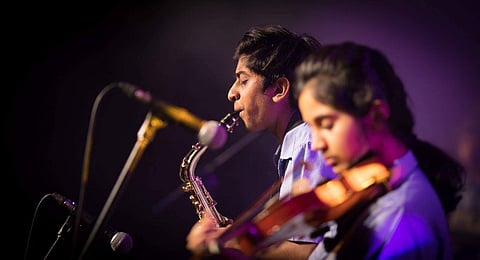

When Rajeev Rajagopal and Bruce Lee Mani got together and started Thermal and a Quarter, the quintessential Bengaluru band, back when they were in college, they never thought that it would go this far — or that they would start mainstream music education through Taaqademy. Ten years down the line, they have redefined music education for kids with a host of initiatives. The one that has the most social impact, though, is No Wall Too High's Full Spectrum Music Programme which was set up to help underprivileged children learn music.
Rajeev, TAAQ's drummer extraordinaire, take us through the story of how this initiative began, "It was the 20th anniversary of Thermal and A Quarter and we were in the process of writing an album called No Wall Too High. We were invited to the United Nations centre in Germany for the launch of this album. We played it because it was coincidentally the anniversary of the fall of the Berlin Wall. At the same time, we decided to expand this initiative to the education sector and teach quality music to 1,500 children from underprivileged families. It was a crowdfunded programme and we raised Rs 10 lakh from friends, followers and others. But from the second year of this programme, we have been running it with our own money."
Taaqademy has since adopted two government schools under this initiative including the Annaswamy Mudaliar School in Cox Town and Nirmala Vidyalaya on Hosa Road. Every week, they conduct classes during which children get access to all kinds of music lessons, instruments and study materials. "The programme is very rewarding in terms of how children are benefitted with music lessons. We teach the same curriculum as we do in other private schools. Though these students can't understand English, they grasp the concepts taught through music easily. Though all students might not want to be a musician, they will develop a well-informed and holistic sensibility towards music," says Rajeev, who is hoping that government schools to reopen soon so that they can resume teaching these kids.
According to Rajeev, a lot of schools these days have been giving a significant amount of importance to music education, apart from core academics. The problem is that parents expect immediate and direct results — like a child learning to play an instrument or sing well. However, as any musician will tell you, it just does not work that way. Rajeev says, "There are many other benefits of teaching music to children other than learning to play instruments or singing. These kids will automatically start performing well in academics. They become more confident, learn to work in teams, study better and so on."
What makes Taaqademy unique is they don't have a structured music programme. They have developed and honed their own curriculumover the years. Rajeev explains, "For instance, if we have 25 to 30 students in a class, it is not possible to teach them to play an instrument. There are concepts beyond merely playing an instrument such as the theory of music and the science behind it. Our curriculum is available from kindergarten to class 12 students and varies for different age groups. For kindergarten kids, we need to make classes fun and engage them to learn. We start with simple rhythm exercises, fun activity songs, understanding what's music and what's noise, understanding pitch and so on. If it is for high school students, then we connect music with History. We tell them to watch and observe these instruments to know the kind of wood used to make it and connect it to various incidents like the Renaissance period, even the Cholas, Pandyas and so on."
What is TAAQademy's lockdown routine?
A week before the lockdown was announced by the government, Taaqademy embraced online classes, but they were a bit different. Since the COVID-19 cases were increasing and situation was getting scary, the team told children to attend classes from home. However, teachers were allowed to visit the academy and conduct classes online. Rajeev remembers the day when the lockdown was announced and they were not prepared for it. "We collected all the music instruments from our academy, tripods for the phones, a background screen to make the video look professional and visited every teacher's home to give them all the necessary equipment to conduct online classes. That day was a mammoth task for us. But our hard work has paid off. Today, we are happy and feel good about all our 50 teachers as they have been able to conduct 6,000 online live streaming classes in the past two months," says Rajeev, who is happy that students from other countries have joined Taaqademy.
TAAQ about the future
With the current situation getting worse every day, Rajeev is planning to introduce blended learning and explore various digital platforms in the future. He says, "We are not going to open all our centres except two centres and we have already offered an option to our teachers of working from home or office. We have already started organising live streaming concerts for our faculty. After all, it is a matter of leading a safe and healthy life. Apart from this, our focus is going to be on developing a platform for online music education. We are currently building digital music modules for children and teachers."
